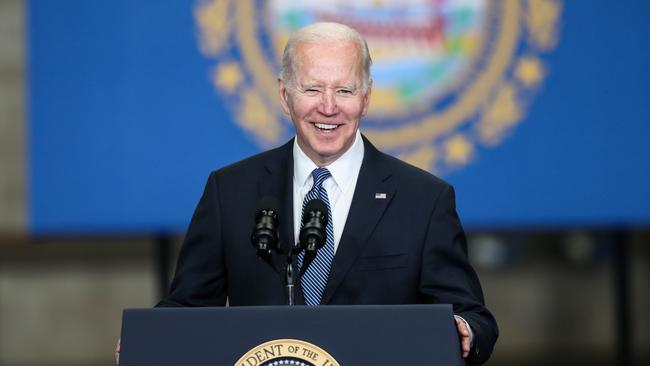Biden administration restores stricter environmental reviews removed by Trump
The Biden administration is restoring stricter environmental standards for approving new infrastructure projects, including requiring consideration of how such projects might affect climate change.

The Biden administration is restoring stricter environmental standards for approving new pipelines, highways, power plants and other construction projects, including requiring consideration of how such projects might affect climate change.
The changes announced Tuesday reinstate National Environmental Policy Act measures that had been removed by former President Donald Trump, who said that federal regulations were needlessly hindering much-needed infrastructure projects.
Under the stricter reviews, federal agencies must take into account the cumulative impacts that a project or a new proposed federal regulation would have in areas such as air and water quality, wildlife habitat and climate change, according to a White House statement. The new guidelines widen the scope of environmental reviews beyond direct and indirect effects.
The Trump administration had deleted from the regulations the definition of cumulative effects, which called on regulators to take into account long-term impacts such as frequent exposure to toxic air. Environmental groups said the absence of that definition confused regulators on whether to analyse those effects.

“Restoring these basic community safeguards will provide regulatory certainty, reduce conflict and help ensure that projects get built right the first time,” said Brenda Mallory, chairwoman of the White House’s Council on Environmental Quality, which helps federal agencies abide by the 1970s law that governs the review process.
The revisions will take effect next month.
Environmental groups have cited violations to the law’s provisions in their legal challenges to projects that build out US infrastructure supporting the oil and gas industry. Prior to its abandonment, the Keystone XL oil pipeline had gotten tied up in court over an environmental review.
Calgary-based Enbridge Inc., one of the largest natural-gas pipeline operators in the US with more than 23,335km of transmission pipelines, argued to keep some of the Trump era changes.
Enbridge spokesman Michael Barnes said the company is reviewing Tuesday’s changes, and referred to the company’s previous statement that “reverting to less efficient and predictable NEPA regulations will not just affect oil and gas pipelines but will delay and complicate the development of new energy facilities and infrastructure.” Last year, the company’s plans to replace a deteriorating crude oil pipeline across Minnesota were challenged in court by environmental and tribal groups who cited issues with the environmental review.
No change was made to rules adopted under Mr Trump that require full environmental-impact statements to be completed within two years and less comprehensive reviews to be finished within one year.
The US Chamber of Commerce and other business trade groups opposed restoring the measures when first proposed last year. Among other objections, the Chamber said the stricter environmental reviews could stall needed improvements funded by the bipartisan $1 trillion infrastructure bill signed by President Biden last year.
The groups, including the American Farm Bureau Federation and the American Chemistry Council, pointed out that the regulations could impede construction of new transmission lines needed to connect clean-energy projects like wind-turbine farms to the power grid.
“With rapidly rising inflation, major supply chain disruptions and workforce shortages, the last thing our country needs is unnecessarily extensive and duplicative bureaucratic red tape and delayed project approvals,” Marty Durbin, the Chamber’s senior vice president for policy, said Tuesday.
The American Petroleum Institute and several other oil and gas groups had objected to requiring cumulative effects as a measure, saying that the new rules could impede projects needed to build pipelines to natural-gas export terminals and satisfy global energy demands.
“With energy costs high for American consumers and European allies looking to the US for access to an affordable and stable energy supply, we need policies in place that provide certainty and ensure American producers can meet rising demand at home and abroad,” said Frank Macchiarola, the group’s senior vice president of policy, economics and regulatory affairs.
Ted Boling, a former Council on Environmental Quality official during the Obama and Trump administrations, who helped develop the 2020 revisions, said he doesn’t think the revisions will slow down infrastructure projects. That is because CEQ officials left most of the Trump change intact, he said, and the revisions they did make will provide clearer guidelines to regulators.
Matthew Davis, senior director of government affairs of the League of Conservation Voters disagreed, saying government approvals are often faulted for holding up projects when other factors such as funding delays are the real cause.
“It’s convenient to blame permitting, but that’s not usually the case,” he said.
Environmental groups said that restoring regulations marked a step in the right direction for legally required reviews, but that more needs to be done.
“The Biden administration still has work to do to ensure federal decision makers prioritise the input of frontline and historically marginalised communities and fully restore” the law’s previous provisions, said Mustafa Santiago Ali, vice president of environmental justice, climate and community revitalisation for the National Wildlife Federation.
White House officials said they are considering additional guidance on greenhouse-gas emissions and plan to propose another round of review-process changes in the next few months.
Leslie Fields, the Sierra Club’s national director of policy, advocacy and legal, said the next round of rule making is expected to undo more Trump changes to the review process “and restore the principles of informed and science-based decision making, transparency and public engagement.” “Donald Trump’s attempts to weaken NEPA were clearly nothing more than a handout to corporate polluters,” she said.
Wall Street Journal






